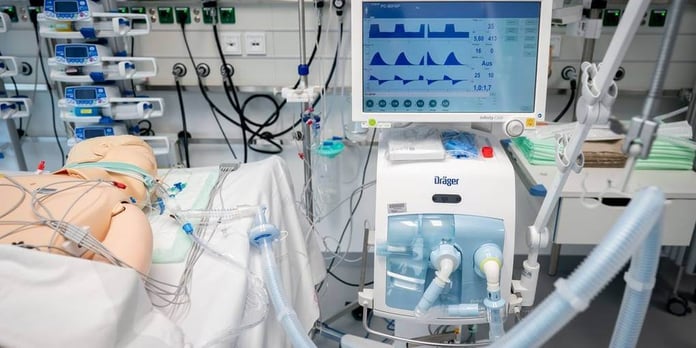Berlin – In the next few weeks, the Corona crisis could lead to a situation in Germany’s hospitals that has never existed in the history of the Federal Republic.
In the worst case, if the intensive care unit is overloaded, doctors would have to decide who is allowed to live and who has to die.
Fortunately, this still does not exist anywhere in Germany, but the epidemic has not yet reached its peak. A situation like in Italy with overloaded intensive care units should be avoided in Germany, but it cannot be ruled out, said the head of the Robert Koch Institute (RKI), Lothar Wieler. “We do everything we can to prevent it from happening.”
The extreme case would be that patients would be disconnected from ventilators in order to save others. “That would be, if the intensive care was actually still medically necessary, strictly legally an act fatally,” explains the legal philosopher Reinhard Merkel, member of the German Ethics Council, an expert council appointed by the President of the Bundestag.
“Take the case of a seriously ill 80-year-old who has the chance to get out of the intensive care unit and then live for three or four years. And now a young mother is brought in in life-threatening condition, and the doctors decide to hang out with the 80-year-old. » If the man’s children were to file a criminal complaint, the public prosecutor would have to open an investigation.
In its recently published recommendation “Solidarity and Responsibility in the Corona Crisis”, the Ethics Council included the wording that the doctor could “expect apologetic leniency of the legal system in such a case”. That means: the act was not lawful, but is not punished. “There is no such thing as a morally guilt-free decision in such a situation,” says Merkel. «But doctors have to be protected from criminal law as best they can in such a dramatic situation. Of course, even if they make the wrong legal decision in individual cases, they are of course not criminals. »
In Alsace, which was badly affected, reports reported that doctors sometimes kept ventilators free for younger people, so that they did not even connect to the 80-year-old. This saves at least the disconnection. “It’s psychologically easier,” says Merkel. “Criminally speaking, it is still a process of killing by omission.” The doctors were actually obliged to save the one who was there.
“If we start to say that the elderly have to be left behind, they have to sacrifice themselves – then that is something that the legal system cannot stand,” said Merkel. “Because it guarantees the same basic rights for everyone.”
It is sometimes different abroad. There, the unconditional protection of individual life is sometimes postponed in favour of a pragmatic approach. This moral philosophy is known as utilitarianism: the collective good is to be maximized – the greatest possible happiness for the greatest possible number of people. In the specific case: It is then decided how the highest number of years of life can be saved – and perhaps also what quality of life the patient can still expect. Merkel: “In general, it can be said that this position can be expected to be more widely accepted in the United States, for example.”
It would be illegal in Germany. In 2006, the Federal Constitutional Court received a law that, in extreme cases, would have allowed the Federal Defense Minister to shoot down an aircraft used by terrorists as a weapon. He should also not do this if the machine was occupied by 100 passengers but would race towards a high-rise building with 1000 office workers. Because, according to the Supreme Court’s argument, human lives can never be set off against each other.
Consistently thought through, if the intensive care units were overloaded, this would mean that a decision would have to be made by lot to ensure absolute equal opportunities, explains the philosopher and medical ethicist Dieter Birnbacher.
In practice, however, doctors ultimately have to prioritize patients. Birnbacher advocates the criterion of the probability of success of the treatment. “We are also familiar with this from the area of organ transplantation, where it is even legally established.”
But what exactly does the probability of success mean? Isn’t it because of age – a criterion that, according to the guidelines of the Ethics Council, must not play a role? “It is a truism that age plays an important role in survival prognosis,” says Uwe Janssens, President of the German Interdisciplinary Association for Intensive Care and Emergency Medicine (DIVI).
«And yet it would be wrong to say that we decide by age. No, it’s not the age, it’s the chances of success. » If the younger one is in poor health due to previous illnesses, then the older one would be preferred. In addition, decisions of this magnitude would always have to be made in a team, says Janssens.
In technical terms, a doctor’s preference for certain patients is referred to as “triage” – a term derived from the French verb “trier”: sort, choose. In Germany with its Nazi history, this word has terrible overtones. “If that happens to us, the discussion will boil up enormously,” Merkel believes. «I don’t know yet if we could endure this. We can still hope to be spared. »
Merkel has been dealing with bioethical questions for decades. He says: «Philosophers have played through such scenarios for a long time, as an ingenious exercise. I never thought that this could one day become a reality in this country. »


